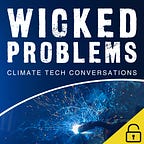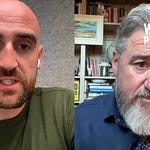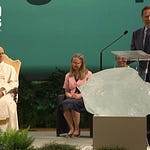Welcome back to Wicked Problems - Climate Tech Conversations. We’ve been out and about this week to get a sense of the state of climate tech, so we snuck into the Climate Impact Summit at the symbolic Royal Institution - where a big chunk of the Industrial Revolution was invented - to listen to dozens of conversations.
Climate Impact Summit
Has the “vibe shift” killed off “climate tech”? Politicians from Lincolnshire to Washington and with plenty of financial lubrication from Houston and the Gulf, seem to be betting that the public simply has stopped caring about climate or wants solutions. Have they succeeded? Or has the end of the era of more or less free money just required a different approach?
So we take you inside the Royal Institution for a sample of some of the conversations we thought were most relevant:
Scaling Climate Tech
Charles Perry, a pioneer who went from seeing Nelson Mandela go from prison to president in four years, who then went on to found BP’s original renewables business before chucking that in to work with Al Gore, chaired a panel that included Zenobē’s Steven Meersman, Extanta Capital’s Yair Reem, Taylor Wessing’s Elinor Picton. With some lively back-and-forths on the right way to finance climate tech companies going forward.
The UK’s Innovation Challenge
Steve Race MP represents Exeter including its university, where a lot of UK climate science is based. He tells a story worth hearing about the mismatch between scientific achievement and British attitudes towards taking an idea and making it profitable.
Is Climate Tech dead?
Sifted’s Freya Pratty put that question to investors including Zachary Webb of M&G Investments. He had plenty to say on why the end of “free money” necessarily means changes in how capital is allocated - and that’s how it’s supposed to work.
Tipping Points and Solar Geoengineering
Gemma Bale of ARIA - the UK’s advanced research and invention agency, kind of a British DARPA - spoke about their programme to develop an early warning system on climate tipping points by studying areas that might give early clues. The agency also just announced grants for 21 projects researching Solar Radiation Modification (SRM), including Degrees Initiative in Bristol - and though “Exploring Climate Cooling” is not directly her programme she makes the ARIA case for doing the research. Kelly Wanser of SilverLining also spoke on the panel, and sounded the alarm that many of the atmospheric and other climate observations the world relied on the US to provide are at risk to fall away - with potentially huge impact on our understanding of how the climate is changing.
Lumisphere: Climate Futures in Art
While at the Summit we caught up with Carey Lovelace, the founder of Visions2030, a nonprofit that tries to help people imagine alternatives to climate disaster. Chris Hayes - her colleague and my former boss - tells how their flagship project - the Lumisphere (first staged in 2023 in California) - will be on the road at COP30 in Brazil, and potentially coming soon after to a city near you.
Convert Well
And finally we bring you a conversation with Belinda Perriman, who travelled the world for decades working in oil & gas before focusing on re-using gas fields for CO2 storage - and some of the challenges and opportunities ahead in CCUS, via her new venture ConvertWell. Wherever you come out on CCS, Belinda’s story is worth hearing.
Habemus Papam
New Pope just dropped. And we plumbed the interwebs to find clues about whether and how he might carry on the climate focus his predecessor Pope Francis. Ten years ago Francis published Laudato Sì - Our Common Home, which many at the negotiations that same year that led to the Paris Agreement said had changed the global conversation.
We started a BlueSky thread to collect and share what we could find about Pope Leo’s background and what it might say. We plan to keep updating it.
tl;dr - when Leo XIV was Bob Prevost from Chicago, when he was a bishop in Peru where he spent 20 years, his last weeks there saw his diocese and his flock devastated by extreme weather made worse by climate change and followed by the most deadly dengue fever outbreak in Peru’s history. His on-the-ground frontline experience seems likely to have shaped his view that the climate crisis is principally about justice - the grotesque unfairness that those who benefitted from the Industrial Revolution refuse to help clean up after its deadly consequences. Here he was in 2023, appealing for help to provide relief to flood victims of that storm.
Coming Soon
We’ve got our interview with Charles Perry up next, plus conversations we’re coming back to with Genevieve Gunther, Patrick Reinsborough, and plenty of others we’re lining up.



















